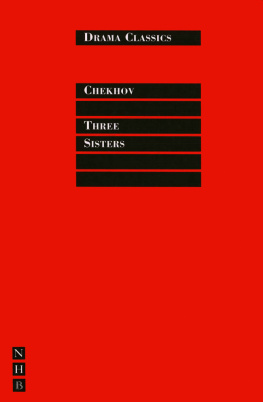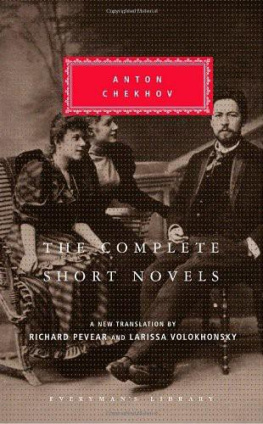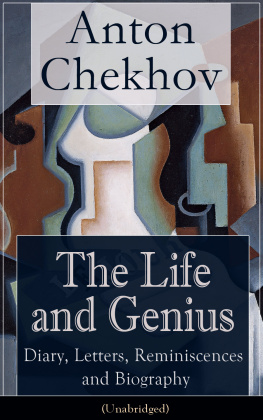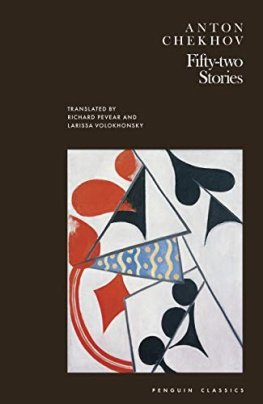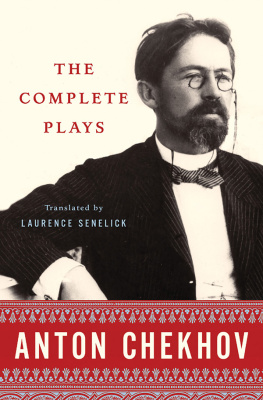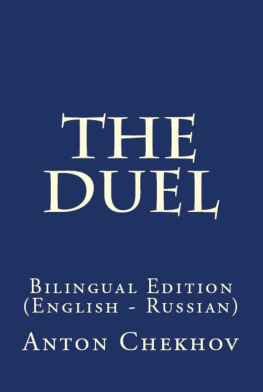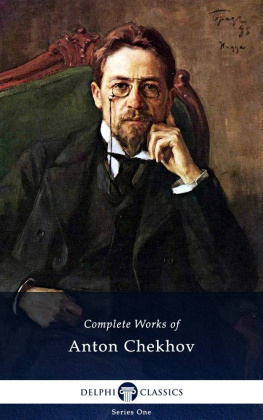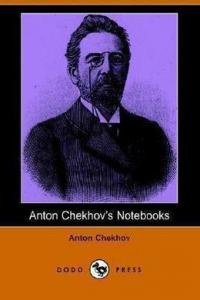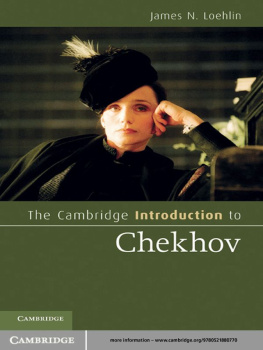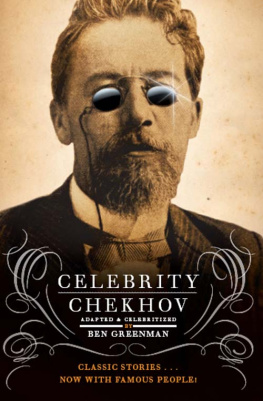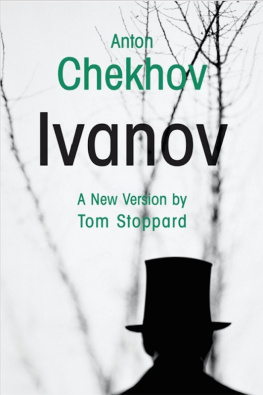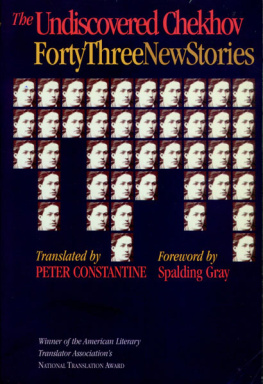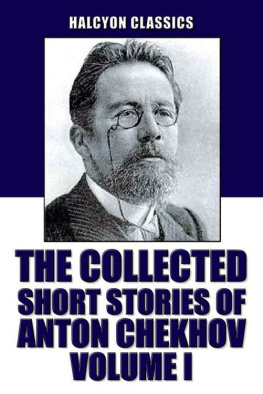Anton Chekhov - Three Sisters: Full Text and Introduction
Here you can read online Anton Chekhov - Three Sisters: Full Text and Introduction full text of the book (entire story) in english for free. Download pdf and epub, get meaning, cover and reviews about this ebook. publisher: Nick Hern Books, genre: Detective and thriller. Description of the work, (preface) as well as reviews are available. Best literature library LitArk.com created for fans of good reading and offers a wide selection of genres:
Romance novel
Science fiction
Adventure
Detective
Science
History
Home and family
Prose
Art
Politics
Computer
Non-fiction
Religion
Business
Children
Humor
Choose a favorite category and find really read worthwhile books. Enjoy immersion in the world of imagination, feel the emotions of the characters or learn something new for yourself, make an fascinating discovery.
- Book:Three Sisters: Full Text and Introduction
- Author:
- Publisher:Nick Hern Books
- Genre:
- Rating:4 / 5
- Favourites:Add to favourites
- Your mark:
- 80
- 1
- 2
- 3
- 4
- 5
Three Sisters: Full Text and Introduction: summary, description and annotation
We offer to read an annotation, description, summary or preface (depends on what the author of the book "Three Sisters: Full Text and Introduction" wrote himself). If you haven't found the necessary information about the book — write in the comments, we will try to find it.
Three Sisters: Full Text and Introduction — read online for free the complete book (whole text) full work
Below is the text of the book, divided by pages. System saving the place of the last page read, allows you to conveniently read the book "Three Sisters: Full Text and Introduction" online for free, without having to search again every time where you left off. Put a bookmark, and you can go to the page where you finished reading at any time.
Font size:
Interval:
Bookmark:

THREE SISTERS
by
Anton Chekhov
translated and introduced by
Stephen Mulrine

NICK HERN BOOKS
London
www.nickhernbooks.co.uk
Introduction
Anton Chekhov (1860-1904)
Anton Pavlovich Chekhov was born in Taganrog in South Russia, in 1860, just before the Emancipation, although his family had been bought out of serfdom some years earlier, by his paternal grandfather. By his own account, Chekhovs childhood was far from idyllic. His father Pavel was a domestic tyrant, fanatically religious, and Chekhov and his brothers were forced to rise before dawn to sing in the local church choir, then work long hours after school, minding the family grocery business.
Chekhovs record at the Taganrog school, not surprisingly, was undistinguished, and at the age of sixteen he was left behind to complete his education, when the family fled to Moscow to escape the consequences of his fathers bankruptcy. In 1879, Chekhov entered Moscow Universitys Faculty of Medicine, and soon became the familys principal breadwinner, writing short comic pieces to supplement his student allowance.
By the time Chekhov qualified in 1884, his literary ambitions were already in conflict with what he regarded as his vocation, and indeed until his own health collapsed, he continued to practise medicine, mostly as an unpaid service. Chekhov was almost certainly infected with tuberculosis from childhood,and the disease was in its terminal stages before he would consent to a diagnosis. In addition to frequent haemorrhaging from the lungs, compelling him to spend the winters in the warm South, Chekhov suffered from a variety of other debilitating ailments, which make his work-rate little short of heroic. In 1899, when he sold the rights in his works to the publisher Marks, they already filled ten volumes, and the critical consensus is that his short stories represent an unparalleled achievement in the form, with the three great plays of his mature dramatic method scarcely less important.
Human relationships are the substance of his work, and it is perhaps no surprise that this most intimate of writers remained elusive in his own relationships. Fond of women, and pursued by several, Chekhov characteristically retreated as they advanced, and it is arguable that the happiness of his brief married life, with the actress Olga Knipper, depended on the lengthy periods of separation forced on the couple by Chekhovs poor health, and Olgas busy metropolitan career.
Finally, in an effort to postpone the inevitable, Chekhov travelled with Olga to Germany for medical treatment, and in July 1904, following a heart attack, he died in the spa town of Badenweiler, at the age of forty-four.
Three Sisters: What Happens in the Play
To write a play exploring a situation in which nothing happens is to risk being accused of writing a play in which nothing happens. This has been Chekhovs fate with Three Sisters: critics used to condemn the play as formless, actionless, plotless any kind of less they could think of. In fact it is tightly controlled, as precise in its effects as poetry, as organisedas chamber music. Rather than revealing the situation in a narrative way, Chekhov sets it out whole and then explores it detail by detail: it is as if we were experiencing a painting or a tapestry, and the plays momentum depends as much on gradual discovery, inexorable revelation, as on plot-surprises or consequentiality.
Olga, Masha and Irina Prozorov are three sisters, daughters of a recently dead general in a remote battalion town. They are upper-middle-class, and feel stifled by the dullness of their provincial environment. They dream of moving to the sophistication and intellectual and emotional fulfilment of Moscow. In the meantime, Olga parcels out her time as an overworked headmistress, Masha is trapped in a stifling marriage to the boring schoolmaster Kulygin, and Irina has a dead-end job in the Post Office. The sisters weak-willed brother Andrei marries a local girl, Natalya, and part of the story involves the way her ferocious ambition and energy becomes more and more at odds with the sisters genteel, conventional and more kindly outlook on life.
If the situation revolves round the growing tension between Natalya and the sisters (and Andreis unhappiness and bafflement as he watches it), the action also involves attempts to break out, to fulfil themselves, by Masha and Irina. Masha begins a love-affair with Vershinin, a colonel in the garrison but it comes to nothing when the regiment is moved on and he leaves her. Irina engages herself to a man she doesnt love, Baron Tuzenbakh but he is killed in a pointless duel. Other characters include two popinjay second lieutenants, Fedotik and Rode, the elderly army doctor Chebutykin, who escapes the dreariness of life by drinking, and the elderly nurse Anfisa, one of the principal targets of Natalyas zeal for change.
In the counterpoint of images and ideas which ally the plays structure to music, two themes are particularly prominent. Tuzenbakh and Vershinin have long conversations, what Chekhov calls philosophising, about how much better life may be 200 years from now, and the metaphor of bird-migration constantly reappears. We humans are like birds, busy about our lives, but underlying everything is the unexplained, unexplainable urge to to take flight, to migrate from this daily existence to another and if this is not acknowledged, or is frustrated, our existence can become insupportable.
Chekhov the Dramatist
Chekhov might be described as par excellence the writers writer, not only on account of his work, or the fund of wisdom in his correspondence, ranging from points of principle to technical wrinkles, but also the example he presents of the restless self-improver, grinding his way over a mere two decades from penny-a-line squibs in the Russian equivalent of Tit-Bits, to the status of modern classic, in both his preferred genres.
In that respect, the year 1887-88 represents a turning-point in his career, with the production in November 1887 of his first four-act play, Ivanov, and the publication, in March the following year, of his short story The Steppe in one of the prestige thick journals, The Northern Herald. The same year also witnessed his official recognition as a major Russian writer with the award of the Pushkin Prize by the Academy of Sciences. Chekhov had arrived, though the extraordinary reception given to the Moscow premire of Ivanov, greeted with mixed cheering and booing, suggested that he hadarrived as a dramatist some way ahead of his audience.
Indeed, that is broadly the story of Chekhovs dramatic career, and it is significant that the main bone of contention in Ivanov, dividing first-nighters into partisans and scoffers, was the authors seeming abdication of any clear moral stance with respect to the plays anti-hero Ivanov and its voice of conscience, the self-righteous Dr Lvov. After some changes, however, the play was successfully revived in St.Petersburg, and Chekhov was sufficiently encouraged by the experience to offer The Wood Demon for production in Moscow the following year. Alas, The Wood Demon was a flop, and in the light of Chekhovs developing method, it is interesting to note that criticism generally centred on its lack of action and dreary, slice-of-life dialogue. Chekhov withdrew the play in disgust, and buried it deep within his mysterious creative processes, whence it re-surfaced in 1898, in the radically altered form of
Font size:
Interval:
Bookmark:
Similar books «Three Sisters: Full Text and Introduction»
Look at similar books to Three Sisters: Full Text and Introduction. We have selected literature similar in name and meaning in the hope of providing readers with more options to find new, interesting, not yet read works.
Discussion, reviews of the book Three Sisters: Full Text and Introduction and just readers' own opinions. Leave your comments, write what you think about the work, its meaning or the main characters. Specify what exactly you liked and what you didn't like, and why you think so.

